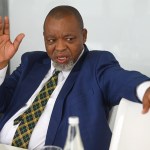At least 40 personnel died and many more were injured in an assault on their convoy in the Indian-controlled district of Pulwama, according to Asian News International. It’s the worst violence since a 2016 ambush on a military camp in Kashmir killed 19 people and prompted India to launch c ross-border attacks against Pakistan. Kashmir has been divided between the two nuclear-armed neighbors since the end of British rule in 1947 and both claim the territory in full. India is estimated to have up to 500,000 troops stationed the region.
Jaish-e-Mohammed, a United Nations listed terror organization set up in Pakistan during the 1990s with an aim of dislodging India’s grip on Kashmir, claimed responsibility for the attack, according to ANI. Pakistan’s government and military have yet to comment on the assault, though Islamabad has repeatedly denied responsibility for violence in Muslim-majority Kashmir.
“This terror group is led by the international terrorist Masood Azhar, who has been given full freedom by the government of Pakistan to operate and expand his terror infrastructure in territories under the control of Pakistan and to carry out attacks in India and elsewhere with impunity,” India’s foreign ministry said in a statement.
Modi condemned the attack, which he described as “despicable” in a tweet on Thursday evening. “The sacrifices of our brave security personnel shall not go in vain.”
‘Enormous Pressure’
The attack, which occurred in the run-up to India’s general elections this year, puts Modi in a difficult situation, said Abhijnan Rej, a New Delhi-based security analyst. A limited response leaves him open to opposition accusations that he’s weak on national security, while a strong military reaction could lead to an escalation and accusations that he’s mismanaged the Kashmir situation, he said.
“There will be enormous pressure on him to do something,” Rej said. “Between this, the elections, the nature of the attack, and the situation in Kashmir, this really complicates things for Modi.”
Central Reserve Police Force Deputy Inspector General M. Dhinakaran confirmed at least one bus carrying 39 passengers was attacked as the convoy — which consisted of 78 vehicles and about 2,500 personnel — traveled through Pulwama. Investigations are continuing into the exact number of dead and injured, he said.
Indian senior government minister, Arun Jaitley, said in a tweet that those responsible “will be given an unforgettable lesson for their heinous act.”
Both India and the U.S. see Pakistan as providing safe haven for terrorist groups and often bring up the fact that the leadership of groups such as Lashkar-e-Taiba, which carried out the gruesome Mumbai attacks in 2008, still live freely in Pakistan.
‘Line of Control’
However, since coming to power last year, Prime Minister Imran Khan and Pakistan’s powerful military have attempted to push for peace with India — which has been seen with deep skepticism in New Delhi and rebuffed ahead of elections. For years both nations’ armies have sporadically exchanging fire across the heavily militarized Kashmiri border — known as the “Line of Control.”
In answer to India’s allegations, Pakistan points to heavy-handed suppression of Kashmir’s Muslim-majority population instigated by Indian security forces.
“Kashmir remains a long pending unresolved issue on UN agenda since 1948,” Major General Asif Ghafoor, Pakistan’s military spokesman, said in his last Tweet posted on Feb. 5. “Decades of atrocities by Indian occupation forces have failed to suppress ever strengthening legitimate freedom struggle. Determined Kashmiris shall succeed.”
For now, Modi is unlikely to react by sending troops across the border, said Sasha Riser-Kositsky, a senior South Asia analyst at New York-based Eurasia Group.
But the Indian premier “could notch a political win by more limited retaliation that falls short of sending troops — for instance shelling or launching missiles targeting facilities said to be terrorist training camps,” he said in a research note. “Beyond the immediate term, the attack today virtually ensures that serious Indo-Pakistani talks remain off the table for another year or more.” DM





















 Become an Insider
Become an Insider